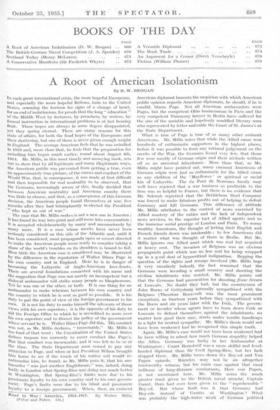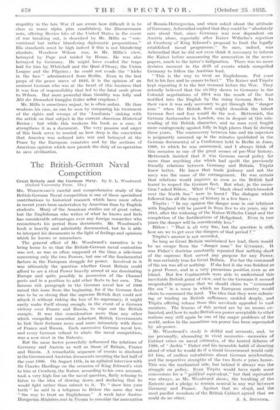A Root of American Isolationism
By D. W. BROGAN 1i each great international crisis, the more hopeful Europeans, and especially the more hopeful Britons, turn to the United States, scanning the horizon for signs of a change of heart, for an end of isolationism, for proofs that the long " education " of the Middle West by lecturers, by preachers, by writers, by formal instruction in international problems is at last bearing fruit. These hopes arc always in some degree disappointed, 'yet they spring eternal. There arc many reasons for this state of affairs, for both the fond hopes of the Europeans and their shattering, but one of them is never given enough weight in England. The average American feels that he was swindled in 1919 and, more than that, he feels that the preparation for swindling him began much earlier, round about August 4th, 1914. Mr. Mills, in this most timely and annoying book, sets out to show that by all legitimate and many illegitimate ways, the. American public was prevented from getting a true, even an approximately true picture, of the causes and conduct of the World War, that, in consequence, it was made at first difficult and then impossible for real neutrality to be observed, that the Germans, increasingly aware of this, finally decided that between American neutrality and American enmity there Was little to choose, and that, as a consequence of this German decision, the American people found themselves at war, five months after they had triumphantly re-elected the President " who kept us out of war."
The case that Mr. Millis makes is not a new one in America ; it has found its Way into print and still more into conversation ; it is accepted wholeheartedly by many and unconsciously by inany more. It is a case whose merits have never' been seriously considered on this side of the Atlantic and, until it has been considered, most propaganda open or covert' directed to make the American people more ready to consider taking a share of the world's troubles on its shoulders is bound to fail. How little the American case is considered may be illustrated .by the difference in the reputation of Walter Hines Page in his own country and in England. Here he is in danger of becoming the Lafayette of Anglo-American love-feasts. There are several foundations connected with his name and the suggestion that Page was not merely an incompetent but a disloyal ambassador will strike many people as blasphemous. Yet he was one or the other, or both. It is one thing for an ambassador to make relations between his own country and the country to which he is sent as good as possible. It is his duty to put the point of view of the foreign government to his It is not his duty to make himself the advocate of those views with his own superiors ; it is the opposite' of hi's duty to aid the Foreign Office to which lie is accredited to score over his own superiors and to thwart the policy of the government Whose servant he is. Walter Hines Page did this, His conduct was not, as Mr. Millis declares, " treasonable." Mr. Millis is too fond of that word ; the Constitution or the United States defines treason too narrowly to cover conduct like Page's. Rut that conduct was inexcusable, and it was felt to be so at the time. The State Department Soon ceased to pay any attention to Page, and when at last President Wilson brought hire home to see if the touch of his native soil would re- nationalise him, he found, as Mr. Millis puts it, that his am-
bassador " was just another Englishman," was, indeed, doing badly in London what Spring-Rice was doing not much better in Washington. But Spring-Rice's faults were duce to his Passionate loyalty to his own country and to his own govern- Inent. ' Page's faults were due to his blind and passionate loYalty to a foreign government. When, then, an eminent Road to War America, 1914-1917. By Walter Millis, • (Pater and Faber. 15s.) American diplomat laments the suspicion with which American public opinion regards American diplomats, he should, if he is candid, blame Page. Not all American ambassadors were Pages, but the competent Ohio businessman in Paris and the very competent Tammany lawyer in Berlin have suffered for the sins of the amiable and hopelessly muddled literary man who represented by letter and cable the Court of St. James's at the State Department.
What is true of Page is true of so many other eminent Americans, Mr. Mills notes that while the Allied cause won hundreds of enthusiastic supporters in the highest places, before it was possible to form any rational judgement on the merits of the War, the Germans found very few, that those few were mostly of German origin and their attitude written off as an ancestral inheritance: More than that, as Mr. Millis might have pointed out, many eminent Americans of German origin were just as enthusiastic for the Allied cause as any children of the ' Mayflower ' or spiritual or racial kin of Lafayette. The du Pont de Nemours family may
well have rejoiced that a war business so profitable to the
firm was so helpful to France, but there is no evidence that Mr. Schwab regretted that the Bethlehem Steel Company was forced to make fabulous profits out of helping to defeat Germany and kill Germans. This difference of attitude Mr. Millis attributes to the control of news exercised by Allied mastery of the cables and the lack of independent news services, to the superior tact of Allied agents and to the immense social prestige of London and Paris. To many wealthy Americans, the thought of letting their English and French friends down was intolerable ; to few Americans did it matter what was thought of them in Berlin, But Mr. Millis ignores one Allied asset which was real but acquired at heavy cost, The invasion of Belgium was an obvious propaganda point which was no less real for being wrapped up in a pod • deal of hypocritical indignation. Begging the question of the rights and wrongs involved (Mr. Mills begs it very cavalierly indeed), the fact remained that the Germans were invading a small country and shooting the
civilian inhabitants who resisted. Mr. Millis points out that the Germans 'had provocation for shooting fratac tireurs
at Louvain, No doubt they had; but the Countrymen of John• Burns of Gettysburg naturally sympathised with the Belgians (Theodore Roosevelt was the most prominent exception), as fourteen years before they sympathised with
the Boers and six years-later with the Irish. The govern- ment or invader 'whose agents have to burn down Cork or
Louvain to defend themselves against the inhabitants, no matter how good their case, starts under terrific handicapS in a fight for neutral sympathy. Mr. Millis's thesis would not haVe been weakened had he recognised this simple truth.
Mr. Millis's' case would not have been weakened had he been willing to admit how much German stupidity helped the AllieS. Germany was lucky in her Ambassador at
Washington ; Count Bernstorff was a more skilful and level- headed diplomat than Sir 'Cecil Spring-Rice, but her luck
stopped there. Mr. Millis' tones down the Boy-ed and Von Papen episode. ' Rintelen ' may not be an altogether trustworthy witness, but his main case against that most bellicose of long-distance combatants, Herr von Papen,
is not mentioned here. Mr. Millis notes the much greater trust given to the British naval attache, Captain Gaunt, than had' ever been given to the " reprehensible " Bey-ed. ' But whose fault, was it that Germany hail Boyieds instead' of Gaunts at Washington ? What Was probably 'the high-Water mark of 'German politiCal stupidity in the late War (I am, aware, how difficult it is ,to class so many alpha plus candidates), the Zimmermann note, offering Mexico bits of. the United States in the event of war breaking out, is described by Mr. Millis as " con- ventional but rather blundering diplomatic . preparations." His standards must be high indeed if this is not blundering absolute. Woodrow Wilson was, in Mr. Millis's view, betrayed by Page and misled by House. He was also betrayed by Germany. He might have evaded the traps laid for him by..Whitehall and the Quai d'Orsay; the Union League and the Pilgrims ; he could not evade the " kicks in the face " administered. from Berlin. Even in the last gasps of the peace move of 1916, it is the opinion of an eminent German .who was at the heart of this business, that it was fear of responsibility that led to the fatal snub given to Wilson. But more powerful than timidity was folly and Mit der Dummheit kdmpfen G Otter selbst vergebens ! •
Mr. Millis is sometimes unjust, he is often unfair. He thus weakens his case, as can be seen by comparing his treatment of the rights and wrongs of the Lusitania sinking with the article on that subject in the current American Historical nevie e ; but while this weakens his book .as a case, it strengthens it as a document, The very .passion and anger of this book serve to remind. us how deep is the conviction that America was seduced into war and betrayed at ...the Peace by the European countries and by the sections of American opinion which now preach the duty of co-operation to save civilisation. .



























































 Previous page
Previous page